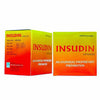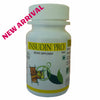Blood sugar (Blood glucose):
In medical terms, blood sugar refers the level of glucose in the blood. Low blood sugar, also known as hypoglycemia, Blood sugar concentration or glucose level is the primary source of energy for the body’s cells. High blood sugar may cause the symptoms of diabetes.
This article describes how to control the diabetes or lower blood sugar in a natural way.
Diabetes:
Diabetes is a disease caused when the levels of sugar or blood glucose are too high. Eventually, having too much glucose in the blood can cause many serious health issues. You may face problems with blood sugar that is too high or too low, even though if you do not have diabetes. Following a regular schedule of eating, exercising, and doing other remedy activities can help to control diabetes.
It is very important to keep your blood sugar level in an optimal range if you have diabetes. You are required to check your blood sugar many times a day. Your health care provider or medical practitioners will also take a blood test called an A1C, which just checks your average sugar level in the past 3 months. If you find that your blood sugar is too high, then you need to follow a special diet or take medicines.
Today, diabetes runs uncontrollably in our society. The sad part is that most of the diabetes problems can be prevented in a natural way via lifestyle changes and dietary. But, still we are heading to insulin shots and other diabetic drugs.
Well, there are some people who are born with a genetic tendency to diabetes need such type of treatment. However, the majority has obtained diabetes. How does this happen?
Mostly, the people who get diabetes later in their life had some sort of genetic issue which facilitated its growth. Diet is the main factor identified as making this jump from pre-diabetic conditions to diabetes. These diet changes not only apply to diabetes, but also impact every part of your health positively.
For instance, obesity is a threat factor behind diabetes problem. Diet is strongly interrelated with your body’s ability to control your blood sugar. In a place or society, which focuses on foods loaded with sugar and simple carbohydrates, it is not a wonder that we have such problems on our hands.
So, what are the natural ways to regulate your blood sugar and prevent affecting from diabetes?
Taking control of diabetes:
If you are a person who is trying to control or prevent diabetes, here is good news for you. Even, you can make a huge difference in your healthy lifestyle. The main thing you have to do for your health is to lose weight, but you need not have to shed all your extra pounds. Experts say that losing just 5% to 10% of your total weight helps to lower blood sugar considerably.
Being overweight is one of the biggest risks for developing diabetes, but not all body fat is same. Studies show that the size of waist is a better predictor of diabetes than BMI (Body Mass Index).
You are at a risk of developing diabetes if you are:
- A man who have 40 inches or more of waist circumference
- A woman with 35 inches or more waist circumference
Even if you have diabetes, no need to worry. It is not too late to make a positive change in yourself. That is, you have more control on your health than anyone think.
Diabetic diet:
Eat right to control diabetes. But, what does that eating right mean? You may be surprised when you read that your nutritional needs are almost the same as everyone have. Be happy that no special foods or difficult diets are necessary.
Exercise is also important, but still what you eat has the greatest impact when we speak about reducing or balancing weight.
Your body cannot properly or make use of insulin when you have diabetes. This leads to high blood glucose levels. Eating healthy keeps the sugar level in a target range. Managing your diabetes may be a critical part, but keeping your blood sugar in control can prevent the problems of diabetes.
A dietitian can help make an eating plan for you. It takes into account your lifestyle, medicines, weight, and other health problems you have, if any. A diet for diabetes is a healthy eating plan that is moderate in calories, low in fat, and rich in nutrients. It is a healthy diet for everyone too. The only difference is that you just need to pay more attention to some of the food, especially the carbohydrates you take.
Healthy diabetic diet includes,
- Three meals and 1 or 2 snacks a day, and do not skip your breakfast.
- Consume a lot of non-starchy vegetables like beans, and fruits such as pears, apples, berries, and peaches. Tropical fruits like mangoes, papayas, and bananas tend to have a lower glycemic index than typical desserts. (The Glycemic Index is nothing but a ranking of carbohydrates on a scale from 0 to 100 according to the extent to which they raise blood sugar levels after eating).
- Choose high-fiber, slow-release carbs. Try high-fiber content like brown rice or wild rice in place of white rice; replace regular pasta by whole-wheat pasta; prefer whole-wheat or whole-grain bread instead of white bread; go for peas or leafy greens instead of corn; have steel-cut oats or rolled oats replacing instant oatmeal.
- Include a healthy protein in your meals such as skinless chicken, fish, and beans.
- Have foods with healthy fats such as nuts (walnuts, almonds, pecans), avocados, and olive oil. Reduce the intake of saturated fats from dairy and other animal products.
- Eat grains in the traditionally processed state like stone-ground bread, natural granola, and muesli breakfast cereals; or least-processed such as whole-kernel bread, whole barley, wheat berries, and millet.
- Avoid sugar-sweetened drinks. Limit your needs on concentrated sweets, as well as high-calorie foods with a low glycemic index like ice cream. You can drink fruit juice to no more than one cup a day.
- Eat slowly and stop when you feel full and satisfied.
The role of fiber in controlling blood sugar:
Fiber (also known as roughage) is the part of foods based on plants (fruits, vegetables, grains, beans, and nuts) that the body can’t break down. Passing through the body undigested, fiber keeps the digestive system clean and healthy, easing bowel movements, blushing cholesterol and carcinogens out of the body.
Fiber is classified into two varieties: soluble and insoluble.
Soluble fiber dissolves in water. It helps to control blood sugar levels and reduce cholesterol. Good sources of soluble fiber include nuts, beans, oatmeal, barley, and fruits such as citrus fruits, berries, pears, and apples.
Insoluble fiber does not dissolve in water and found in wheat cereals, whole grains, and vegetables such as tomatoes, carrots, and celery. It is the bulky fiber that helps to prevent constipation.
Most of the foods have both soluble and insoluble fiber. In more cases, the more natural and unprocessed food will be fiber high. Meat, dairy products, sugar has no fiber content. Almost all fiber content is removed in white or refined foods such as pastries, white bread, and white rice.
Fiber provides much more than a healthy way to stay regular. Different studies proved that eating a diet high in fiber can boost the health system and make one feel good.
A diet high in fiber, especially insoluble fiber from cereals, can reduce the risk for type 2 diabetes. If you have diabetes, consuming soluble fiber can slow the absorption of sugar and enhance your blood sugar levels. Also, fiber supplements may lessen blood sugar levels. Consult with your healthcare provider about adding supplements to your diet.
Intake of high fiber can assist to lose weight. Fiber helps to regulate blood sugar levels, and maintains the body’s fat-burning capacity. Eating a lot of fiber can move fat through your digestive system at a faster rate. When you fill your stomach with high-fiber foods, you will also get more energy in your body.
Diabetes and exercise:
Exercise helps to improve your blood sugar control, boost your body fitness and reduce the risk of heart diseases and medications. Make sure to track your blood sugar before and after doing exercise, as your records will reveal how your body responds to the exercises.
Before getting into the fitness program, discuss with your trainer and medical practitioner about the type of exercises/ activities you are going to do. For best results, experts suggest 150 minutes a week of moderately intense physical activities (like bicycling, swimming, and fast walking).
Consider the below guidelines related to your blood sugar level:
300 mg/dL (16.7 mmol/L) or higher: Delay your workout until the blood sugar comes with a safe pre-exercise range, as these high glucose levels may increase the risk of dehydration and ketoacidosis.
250 mg/dL (13.9 mmol/L) or higher: This is a warning zone. Before starting exercising, test your urine for ketones. If the test shows excess ketones, your body doesn’t have enough insulin to control your blood glucose. It is safe to exercise when the test kit shows a low level or absence of ketones in the urine.
100 to 250 mg/dL (5.6 to 13.9 mmol/L): For many people, this is a safe pre-exercise blood sugar range. And so, you are good to go.
Lower than 100 mg/dL (5.6 mmol/L): Your blood glucose may be too low to perform exercise in a safe zone. So, before you begin your workout, eat a small snack containing carbohydrate such as fruit or crackers.
Stop exercising if:
- You feel confused, shaky, or weak
- Your blood sugar is 70 mg/dL (3.9 mmol/L) or lower
Drink or eat something to raise your glucose level like:
- Five or six pieces of hard candy
- 1/2 cup (118 milliliters) of regular (not diet) soda
- 1/2 cup (118 milliliters) of fruit juice
The exercise draws on reserve sugar stored in your liver and muscles. It takes the sugar from the blood, as your body rebuilds these stores. When you do, the more tiring workout, the longer your blood sugar will be affected.
Conclusion:
With diabetes or high blood sugar evolving into a serious public health burden worldwide, it is important to take steps to solve this problem. Believe in eating natural foods, which our bodies were designed to eat. Make naturally healthy diet foods and follow healthy exercises to stay healthy.
Let down high blood sugar in an organic way!







